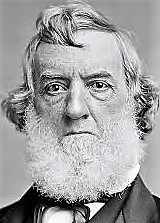
Previously in the novel: War Secretary Stanton holds the Lincolns captive under guard in the White House basement. Stanton selects Duff, an AWOL convict,to impersonate Lincoln. Duff forms his own opinions about cabinet members.
Leaning back in his chair, Duff relaxed, confident of handling the Cabinet meeting. He was learning to deal with the egos of all the self-important men around the table. He liked some more than others. Attorney General Edward Bates reminded him of himself, little formal education and even less pretension. Duff still mourned the death of Interior Secretary Caleb Smith, a Midwesterner like himself. Smith’s replacement, John Usher, was a mystery to him. Since Stanton had recommended him, Duff did not to trust Usher.
“Mr. President, the gallant men of Maine should receive special commendation for their defense of Little Round Top yesterday,” Stanton said. “They saved Gettysburg from falling to the rebels.”
Absolute loathing covered Duff like a cold, wet wool blanket, and he remembered that sensation from his days prior to the first battle of Manassas. As much as he was choked with fear at the battle and as much as he was smothered by terror when he was captured, Duff felt even stronger emotions toward Stanton, who was adjusting his pebble glasses on his little nose. Duff nodded in acknowledgement of Stanton’s announcement but said nothing. He learned this was the safest response to any comment during a Cabinet meeting.
“The latest telegraph reports indicate today’s events should be the most pivotal since the second Manassas,” Stanton continued.
“Ah, fireworks for the Fourth of July,” Duff replied.
Laughter filled the room and boosted his self-esteem and eased his hatred toward Stanton. Among the others around the table, only one merited Duff’s respect: Secretary of the Navy Gideon Welles. He had to be careful not to be too friendly. The real Lincoln found Welles senile and altogether ludicrous in his large, ill-fitting white wig. Duff, on the other hand, found Welles to be profoundly wise.
“When was the last wire received?” Seward asked.
Duff did not trust Seward, whom he found hard to decipher; in other words, he could not tell if Seward believed him to be Lincoln.
“Wires within the last hour indicate Lee’s forces appear ready to advance on the center of General Meade’s line,” Stanton replied.
“Is this necessarily a bad thing?” Chase intoned.
Chase evoked mere disdain from Duff, who saw him as a sanctimonious fool. He did not worry if Chase realized he was not Lincoln, because Chase never looked him in the eye or listened to what he said, as though Duff were inconsequential.
“We don’t know at this time,” Stanton said.
Most of all, Duff hated Stanton for his contemptuous attitude Stanton of Alethia, whom he had grown to love over the past year. Duff hesitated to tell her, because then he would have to tell her his secrets, and if she learned of all the horrible sins he had committed, she would surely hate him.
“Will you keep us informed?” Welles asked.
“Of course.” Stanton smiled with condescension.
“I was talking to Mr. Lincoln,” Welles retorted.
“Everyone at this table has access to the telegraph wires at the War Department,” Duff said, noticing the grimace on Stanton’s face.
“I know that.” Welles nodded. “I just wanted to hear it from you. Sometimes it becomes a bit weary, learning official war news from Mr. Stanton.”
“Mr. Welles, may I remind you I’m the secretary of war; therefore, by definition, all information concerning the war should come through me.”
“Forgive me, Mr. Stanton, but as attorney general,” Bates interjected, “it’s my obligation to remind you that the Constitution names the president as commander in chief of the armed forces, therefore superseding you as the ultimate authority on releasing war news.”
“I stand corrected.” Stanton pursed his Cupid’s bow lips.
Duff could hardly restrain the smile creeping across his lips; instead, he surveyed the room, trying to look wise. No one seriously doubted he was president, he decided, except Stanton.
On his staff, the only person who might suspect something was Nicolay, so Duff had sent him on a special mission to Colorado. With any luck, the war would end by the time he had returned. While Duff never thought himself to be bright, he prided himself on detecting intelligence in others, and he deemed Nicolay one of the smartest men in Washington, which made him dangerous.
“Mr. Hay, do you have all this commotion on paper?” Duff asked.
“Yes, sir.”
“And it was all clear as mud, correct?”
Hay laughed and nodded his head.
He was a good boy, Hay was, but not as bright as Nicolay, Duff thought. Perhaps he was as smart as Nicolay, but he was so preoccupied with pretty women and strong liquor that his keener senses were unnaturally blunted. Hay did not consider it strange that Duff sent him to a bookstore to buy a copy of Rose Greenhow’s prison memoirs, My Imprisonment and First Year of Abolitionist Rule in Washington, not questioning why President Lincoln would be interested in a book written by a rebel spy.
“Is there any other business?” He looked pointedly into the eyes of each Cabinet member. When no one spoke, Duff sighed. “Then, let us adjourn to prepare for Independence Day.”
FIFTY-FOUR
Monthly Archives: April 2018
Burly Chapter Sixteen
(Previously in the book: For his fifth birthday Herman received a home-made bear, which magically came to life when Herman’s tear fell on him. As Herman grew up, life was happy–he liked school and his brother Tad was nicer. But mama died one night. Papa decided sister Callie should go live with relatives. She came home for a happy Christmas.)
The bittersweet Christmas soon faded in Herman’s mind as the months lengthened into years. Visits from Callie would become less frequent because Uncle Calvin had gotten a new job in Houston and about to move the family from Texarkana. When Uncle Calvin, Aunt Joyce and Callie came for their last visit before the move, Callie and Herman exchanged easy lies about how Houston wasn’t that far away and they would see each other often. The truth was too painful. At least Tad didn’t wait for Callie to hug him this time, which made Herman feel a little bit better. But Tad was almost seventeen and far too old to act silly and stubborn around a sister he might never see again. Even papa broke away from his long, sorrowful stares across the prairie to give Callie a warm hug and a kiss on the cheek. He even shook Uncle Calvin’s hand and gave Aunt Joyce a shy hug.
“I’m sorry to take your girl away like this,” Uncle Calvin explained in a sad sort of way. “But they’re building like crazy down there and construction’s the ground floor job, if you know what I mean.”
“Sure, Calvin,” papa said as friendly as his continuing grief would allow him.
“It’s a risk, I know,” Aunt Joyce added, “but if Calvin can hit it big that’ll mean a better education for Callie and the boys.”
“Yes,” Uncle Calvin emphasized. “We’re not just looking after the girl but all the children. If I can help them get on better, I want to.”
Papa stiffened. “The boys will do all right.”
“Sure, I know they will,” Uncle Calvin said as an apology.
Then they were gone. Tad grumbled about how Uncle Calvin was acting uppity and that they didn’t need any help.
“Calvin’s a good man,” papa rasped. “He means good by us all.”
“Yes, papa,” Tad whispered.
Herman was confused and excited by what Uncle Calvin said. Up until now he had not given much thought about what was going to happen when he grew up. But he was eleven years old and such thoughts were creeping into his mind and scaring him.
“What will happen to me?” Herman asked Burly late that night.
“You’re going to grow up,” Burly said.
“But what will I be when I grow up?” Herman persisted.
“A man,” Burly replied.
“But—“
“Whatever you become,” Burly interrupted him, “you will always be Herman. And being Herman is a wonderful thing.”
Herman hugged him. “Thank you, Burly.” He paused and noticed his bear’s little burlap face was turned down. “Are you sad, Burly?”
“I’ll never see my mother again,” Burly said.
“And I’ll never see my wife again,” Burly Senior whispered from across the room.
“Oh,” Herman replied as though suddenly realizing something. “You have lost your mother today and that makes you very sad. I didn’t think of that. All I could think have was my own problems. I’m sorry.”
“That’s all right,” Burly assured him. “Most people are like that. They never stop to look at things from the way other people look at them.”
“But you’re better than most,” Burly Senior added. “In fact, you’re doing a pretty good job at seeing the world as your father and your brother see it.”
Herman sighed. “Sometimes I wonder if I do. I don’t really know how Tad feels most of the time.”
“Take it from me,” Burly Senior offered. “He’s very sad. A very lonely, scared little boy he is.”
“How can you tell?” Herman asked.
“By the way he is squeezing me right now.”
When spring came and the wildflowers were coloring the hills everywhere, Herman noticed Tad seemed happier and spent less time home after all his chores were done. He was beginning to have friends. Herman was happy for him, for he still didn’t have many children from his class who were his friends so he knew how Tad felt.
“Don’t worry,” Burly said one afternoon after Tad had run off to play with his new buddies. “Someday you will have boys your age to be your friends.”
“But why don’t they like me now?” Herman asked.
“I like you now,” Burly replied.
Herman smiled and hugged his little burlap friend. “I know you do, but what can I do to make the boys at school like me?”
“If you have to do anything to make them like you then they aren’t really going to be your friends anyway.”
Sighing, Herman gave Burly another hug. After school was out for the summer, Herman changed his mind about Tad’s friends because they began to spend more time at the farm and Herman saw what they were really like. One of them, a tall, stringy-looking boy with lots of freckles and straw-like hair, liked to tease Herman for being too short and not being able to run very fast or play baseball very well. He made Herman feel like he was dumb sometimes when he would pull a mean trick on him. His name was Leonard. The other boy, Stevie, was shorter than Tad but bigger and broader. He sulked about all the time and didn’t say much, except an occasional threatening grunt. Steve always looked at Herman as though he would like to beat him up. Of course, both boys would straighten and be polite when papa walked by. Papa may have been skinny but he was strong and he acted like he might explode into a violent temper tantrum at any moment.
Ireland and England With Jerry and Josh Kissing the Blarney Stone

People who know me think my kissing the Blarney Stone is like carrying coals to Newcastle. I’m filled with enough Blarney as it is. (Or is that baloney?)
Like most good tourist attractions Blarney Castle cannot be seen from the road or even before you pay for your ticket to enter. You have to turn a certain corner, and there it is. Like many things on our tour, it was half covered with scaffolding which did not detract from its mythological majesty. Josh and I decided to get in line early before I dawdled too much and started wearing down. He took a quick picture of me when I still felt like smiling. The initial path up to the castle gate was not so bad. We had a great view of the half-demolished castle keep. Then the ascent began. As the docent explained at Bunratty Castle, the stairs were strategically built steep and uneven to slow down the assault of attacking troops. Sometimes they switched from turning right to turning left as they ever went higher. Along the way, the staircase opened to reveal side rooms. I stepped into a couple of them just for the chance to take a breath. That put me behind Josh, but I didn’t mind. How could I get lost? There was only one way up and one way down. Once we were at the top, we waited in line to kiss the stone. In front of me my friend the teacher called across way to my son who had already kissed the stone.
“Where’s your father? He didn’t come up here, did he?”
“Yes, I did,” I called out from behind her.
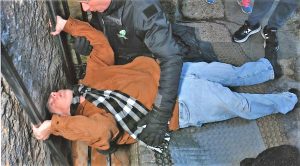
When I got to the stone I realized this area was the target of all the scaffolding. Before the renovations, there had been steel bars below the stone. It would really ruin someone’s vacation to slip from the grasp of the guide and fall into the moat below. In the middle of the renovation a thick plywood board replaced the bars, which took all the fun of leaning over backwards. I didn’t asked but I assumed—and hoped—eventually a nice thick slab of plexiglass would be installed so that you could still see the view upside down but have absolutely no chance of falling to the ground. As an aging male, I wanted all the strangers standing around me to know for certain that I was not afraid. I scooted my old hiney as far off the castle wall as I could before I leaned back. Unfortunately my hiney went so far off the edge I had trouble getting my head down to the legendary stone. Eventually I wriggled my face down and kissed it twice—once for myself and once for my wife Janet who died two years ago of cancer. I loved her but frankly she could have used a bit more blarney. My mission accomplished, I began to sit up and remembered how far out I stuck and I was indeed stuck. I couldn’t move. Luckily the castle guide has seen every combination of discomfort so he had me unstuck and on my way quickly.
The descent was easier, except when I had to put weight on my left knee which was beginning to scream that it wasn’t having any fun. One of the major tenets of the aging male is that you’re not supposed to slow down, grimace, or otherwise show you are in pain. I continued to hop down the stairs like nothing was wrong. Luckily about three quarters of the way I caught up with Josh at the photo stand to see which pictures of me upside I wanted to buy for posterity. Actually this was a perfect opportunity to catch my breath and to let my whiney knee calm down. I decided to buy both. One showed me actually kissing the stone but my face wasn’t showing. The second was slightly pre-kiss and showed that it was, indeed, me smooching the stone.

At the bottom, Josh photographed me leaning against an anonymous wall. My smile was not up to its usual standards. Behind me were a myriad of gardens with waterfalls and a garden of poisoned plants. This was necessary when you had a dinner party and wanted the guest of honor to be dead by midnight. I think I disappointed Josh because instead of strolling through the gardens I wanted to get to the nearest pub for liquid refreshment and food.
Here’s a great tourist tip: Anytime you’re thirsty and hungry in Ireland, find the nearest pub. You can’t go wrong.
David, Wallis and the Mercenary Chapter 28

Previously in the novel: Novice mercenary Leon fails in kidnapping the Archbishop of Canterbury because of David, better known as Edward the Prince of Wales. Also in the world of espionage is socialite Wallis Spencer. Wallis, in quick succession, dumps first husband Winfield, kills Uncle Sol, has an affair with German Joachin Von Ribbentrop and marries Ernest.Ribbentrop meets Hitler.
The years between 1925 and 1929 were probably the happiest and most prosperous time of Leon’s life. His customer from the New York jewelry job had been extremely generous so Leon found himself able to pick and choose new assignments for almost three years. During this period he had become his son Sidney’s best friend. He taught the boy how to walk, how to wrap his tongue around English words, as well as other languages such as French, German and Spanish. Mastery of those languages would assure him of the best pay on the European continent. When Sidney was older, he would learn the more complex languages of Arabic, Hindi, Chinese and Japanese. That was later. There was plenty of time.
One day late in October 1929 Leon played in the surf of the Caribbean with his son as the morning sun rose high in the sky. A fishing boat on the horizon brought back memories of his own father. Leon could still smell the ocean spray after a rain, fresh and salty. Each fish had its own peculiar aroma. Most of all, he recalled the scent of his father. He smelled of love. Leon picked up Sidney and pointed to the boat.
“Do you know what that is?”
“Fishing boat.”
“Would you like to go on one of those someday?”
Sidney wriggled in his father’s arms. “Today! Today!”
Leon laughed. “Not today.” He put the boy down and extended his arm out above the boy’s head and flexed his muscles. “Jump up and see if you can grab my arm.”
Laughing, Sidney jumped several times before latching on. “I did it! I did it!”
“Good job. You did not give up. You fail only when you give up.” He lifted his arm a little. “Now lift yourself until your chin touches the top of my muscle.”
Sidney grunted and tried to lift himself several times until he fell to the sand. He looked up at his father. “Did I fail?”
“No.” Leon lifted his son and hugged him. “You just did not succeed today. You will try again tomorrow.”
“No! Try again now! Now!”
Leon began to walk back to the hacienda. “There is a time to try and a time to eat lunch. Come. Let us fill our bellies.”
They jogged along the sandy road until Leon saw the flower pot in front of their gate. It was slightly askew. He put Sidney down and told him to run inside and tell his mother how he jumped so high he could grab his father’s arm. Leon frowned as he stood over the pot. It meant a new assignment was finally here. He missed time away from his son. He pondered ignoring the message. He had plenty of money, enough to last some time to come. But eventually, however, the funds would be expended and once an agent had turned down a job, he would never get another one. And Leon vowed never to fish for a living again. He loved this new life of his too much. Eventually he bent over, lifted the dead plant and took out the message.
“Tonight at the Rialto.”
Laughter dominated the dining table. Sidney bounced around like a ball talking about their walk up the beach. A wave of his arm knocked over his glass of milk. Jessamine slipped to her knees and wiped up the milk and gathered together the shards of glass.
“What a boy!” She beamed as though he had just won a game with the other island boys, which he often did.
“He’s just like his grandfather Jedidiah.” Granny Dorothy smiled at Leon with affection and pride.
He detected a glistening tear in her eye which she quickly daubed away. Taking a mouthful of grilled bass into his mouth, Leon announced, “I will be leaving on another one of my business trips soon.”
“I will clean your white suit,” Dotty announced.
“I want to go with you!” Sidney’s face brightened as he bounced in his chair again.
“No, my son. You are still too young. One day. It will come before you know it.”
Sidney jumped down and ran to his father. “No! I wanna go now!”
“What a tone to use with your father!” Jessamine changed aprons and returned to the table. She picked up her son. “You need a nap. I can tell.”
“No! I don’t want a nap!”
“Listen to your mother,” Dotty said absently as she stood and headed upstairs to the bedrooms. “When do you need your suit clean.”
“I have to leave for Nassau in an hour.”
She turned to look at her son. “That won’t be enough time.”
Jessamine was already up the stairs with a sleeping Sidney draped across her shoulder.
Leon stood. “Don’t worry. I shall be back late tonight. My trip won’t be for some time.”
“I’m getting old.” Dotty shook her head. “Of course. I know. I remember now. Like all the other times.”
An hour later Leon walked out of the hacienda gate wearing his white linen suit. He inspected the suit and decided Dotty did indeed worry too much. His suit was in fine condition. He looked around as he felt arms around his waist. It was Jessamine. When he turned she kissed him on the lips and then snuggled her face into his neck.
“Pooka said you would be leaving soon.”
“I wish you wouldn’t listen to Pooka,” he mumbled. “I don’t believe anything she says.”
Her eyes widened. “But Pooka is never wrong.”
Leon loved his wife very much. Perhaps she might not have been the brightest woman on the island, he conceded, but she was the sweetest and the most loving. He pecked her on the forehead and again began his amble down to the dock. As he walked he considered the absence of Old Joe who had died a few years ago. Leon supposed Joe died of old age. But he did miss him terribly. Who else could he trust to share his deepest worries and doubts? In a few moments he reached the dock and connected to his new fisherman who transported him to Freeport. He caught the ferry to Nassau. By sunset he walked into the casino puffing on a cigarette. He went straight to the lovely lady at the blackjack table. She had matured from the first time they had met over cards in the Rialto. More seductive. More buxom. But still cynical. She was always cynical. The blonde dealer dealt him a hand which contained the ace of diamonds with a tightly folded note taped to it. In one smooth motion Leon detached it and slipped into his inner jacket pocket.
“Tell me.” Leon lit another cigarette. “Does someone pay you to pass on these notes and you ask no questions, or do you know what you’re truly doing?”
As she dealt another hand, she pouted her red lips. “You’re the most handsome man I’ve met, but you’re still a jerk.”
“That isn’t an answer.”
“That’s the only answer you’re going to get.” She looked down at the cards. “You lose. Again.”
Leon laughed and walked away. Within the next hour he was on a ferry back to Freeport. Sitting in a chair under a deck lamp, Leon took out the noted and read it.
“Tanganyika Express Nov. 3.”
He knew Tanganyika was in Africa. That reminded him to insist Sidney be taught world geography by a knowledgeable person. He grunted. Certainly not Pooka. He stood and wentto the rail where he casually let the note slip from his hand into the deep waters below. He wondered what the weather was like in Tanganyika this time of year.
“Your drink, sir.”
Turning, Leon saw a waiter with a glass he had not ordered. He said nothing, took a bill out of his wallet, placed it on the small silver tray and took the drink. The waiter bowed and left. Leon noticed the napkin stuck to the bottom of the glass had writing on it. He went back to his chair, sat, began to drink leisurely and unfolded the napkin. He glanced around the deck to see if anyone was strolling about before he read it. Leon learned the number of train, the departure place and time. His assignment was to seduce an English lady named Barnes. In her purse would be a velvet pouch of priceless jewels which she would give him. He then would pass it on to another agent when the train reached its destination, where he would be generously paid.
This was his first assignment which relied exclusively on his romantic skills. He was not intimidated. Leon remembered quite well his sexual interlude with Mrs. Ribbentrop many years ago. Leon hoped the Barnes woman was a Bolshevik too.
Ireland and England with Jerry and Josh Jaunting Around Killarney
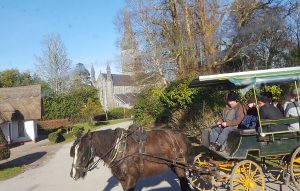
When we finished our tour of the Ring of Kerry, our group decided to jaunt our way through the national park at Killarney. Not jogging. Jogging would have killed me. No, we rode a jaunting carriage pulled by a very hairy horse.
My friend the school teacher who arranged for my son Josh and I to be part of the tour said she hoped this went better than the gondola ride around Venice on one of her student tours a few years ago. The gondolier didn’t sing, didn’t talk about the sights they were passing and didn’t flirt with the women on the boat. What kind of an Italian was he? Our Irish carriage driver invited my friend to sit up front with him and included her in all his comments about the foliage, mountains, lakes and history of old Killarney. I think she came away liking Irish jaunting drivers better than Italian gondoliers.
The jaunting carriage tour began in downtown Killarney, turned a corner and entered the national park. In my first photo, you can see a touring carriage with Killarney cathedral in the background. I know the jaunting driver looks like me, but I couldn’t be taking pictures of one carriage if I were in another one. What this picture does prove is that I have a lot of Irish relatives in my past. By the way, the cathedral was very impressive. We could see it many miles away before our tour bus even got to the city limits. Many residents of Killarney don’t share the tourists’ appreciation, though. The Roman Catholic Church built the cathedral in the early part of the nineteenth century when Ireland was going through the Potato Famine. The church thought the big cathedral would give the residents inspiration. As I was told by more than one local, they would have preferred a good meal instead.

Our gregarious driver told us they had just had a late snow a few days before we arrived. In the distance we could see the mountaintops still covered in snow. He pointed out the little flower bulb sprouts were peeking through the ground and in a few weeks the entire park would be resplendent in color. Several trees had gone down during the storm and they were laying around wondering if they would be eventually cut and carried out or be left to rot and become wonderful mulch. It was still cold when our carriage horse tried its best to avoid the washed-out portions of the road. The sun shone and the wind had disappeared with the snow, so the weather was really quite pleasant, as long as you were dressed in at least three layers of clothes, wore a woolen cap and gloves. Ducks waddling alongside the road didn’t seem mind the crisp air. Neither did the Killarney natives who jogged past us. The second picture shows my elbow which was properly attired in a heavy coat.
At several points we saw crumbled stone ruins hiding among the trees and when we turned a bend in the road we saw an old castle glistening in the sun’s rays as it sat on an island of a long, wide lake.

“I’m sure you’re all wondering what happened to all these homes and castles,” our driver asked in his delightful accent. “Have you ever heard of a man by the name of Oliver Cromwell? He was the Englishman who was responsible for the beheading of Charles the First. He decided the English should come live in Ireland. The only problem with that was the land was already occupied by the Irish. His solution was to kill every Irishman in the country. His army rampaged throughout the island, killing the residents and burning and tearing down their homes. The Irish lords who lived in the castle on the island held out as long as they could but they eventually succumbed. Fortunately the English hated Cromwell as much as the Irish so he was beheaded, and Charles the Second was asked to take the throne.”
I knew the tour was coming to an end because in the distance I saw modern condominium communities on the outskirts of Killarney. You can’t get away from the modern world no matter where you go. That is not an entirely bad thing, however. When we returned to the tour station, we embarked, handed our entertaining guide a tip and found only a few steps away a toilet facility. We climbed onto our bus and on our way to our quaint Irish hotel we passed several outlet malls featuring the latest of everything at the lowest prices. The hotel itself was lovely but challenging. It was several years old, and the owners had added rooms and extra floors wherever it was convenient. My son Josh and I felt we needed a map to get to our beds.
But at least we didn’t have to sleep in a desolate castle destroyed by Oliver Cromwell.
Lincoln in the Basement Chapter Fifty-Two
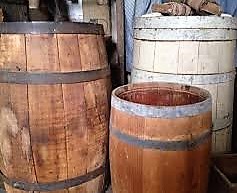
Previously in the novel: War Secretary Stanton holds the Lincolns captive under guard in the White House basement. Janitor Gabby Zook by accident must stay in the basement too.
This makes him witness to conversations he doesn’t want to hear.
Have a seat, Mr. Secretary,” Lincoln said. Scratching of chairs covered another comment which Gabby couldn’t understand. Lincoln chuckled and Stanton harrumphed.
“The information from Chancellorsville was late yesterday afternoon. There was a surprise attack led by General Jackson.”
“How bad was it?” the president asked.
“Hooker was caught off-guard and—“
“More lives lost.” Lincoln sighed. “More lives will be lost.”
“Meade acquitted himself well, but it was not enough.”
“Meade’s a good man.”
“Hooker must be replaced,” Stanton said.
Gabby became aware of an awkward pause.
“Or perhaps he should be given another opportunity,” Stanton offered. His tone was softer.
He wanted Lincoln to decide, Gabby thought, but Stanton did not want to say so. The war secretary wanted the president to say what he would tell the cabinet upstairs, except he was still locked in the basement. The president, Gabby repeated in his mind. If he—Gabby–were actually president, then perhaps Stanton was waiting for him to step from behind the crates and barrels to tell him what to do. Gabby moved a foot slightly before two other thoughts seeped into his mind: he did not know what to do, and if he were indeed president, he would follow the adage that the leader who leads least, leads best.
“And if Hooker were replaced,” Stanton continued after another long silence, “who’d replace him?”
Again, stinging silence controlled the room.
“You’ve nothing to say?” Stanton asked.
“Oh. You expected a response,” Lincoln ingeniously replied. “I presumed you were merely thinking out loud.”
“You know very well I wasn’t.” Stanton spat. “If I wish to think aloud I needn’t come here.”
Gabby heard Lincoln’s sigh and respected his remarkable restraint.
“Where will you put me if I’m wrong this time, Old Capitol Prison?”
Stanton began to gurgle in indignation.
“I apologize,” Lincoln said. Gabby thought he should not have. “Try to forget what I said. I seem to be in the middle of a malaise. Why I should be melancholy I don’t know—once again I slide into irony. It’s the Union’s future that’s important, and not me.”
“Thank you, sir,” Stanton whispered.
“Replace Hooker with Meade. With whom we shall eventually replace Meade can be discussed another day.”
Very wise that I stepped back to allow Lincoln to decide, Gabby thought. He did well. Chairs shuffled about, indicating Stanton was leaving.
“Mr. Stanton?” Mrs. Lincoln’s voice was subdued.
“Yes?” he wearily replied.
“I’m worried about Private Christy. His clothes are disheveled and his hair—“
“His appearance is his own business.” Stanton turned away.
“I’m not complaining about his appearance,” Mrs. Lincoln persisted. “It’s the reason for his appearance. He’s not happy.”
“We’re at war.” H emitted a brutal laugh. “No one’s happy.”
Before she could reply, the door opened. Gabby could see that it was Adam returning the chamber pots. Stanton left, and Lincoln disappeared behind his curtain. Mrs. Lincoln just stood there, eyeing Adam with sympathy. Gabby wanted to help. After Adam put the pots in their respective places, Gabby remembered what the strange man in the straw hat said to him. He reached out to touch the private’s arm.
“Ocean waves taught me always to see beyond the things on hand as the ocean always points beyond the waves of the moment.”
“Huh?”
Gabby followed Adam to the door.
“Young men are meant to laugh and play.”
“All right.” Adam wrinkled his brow as he unlocked the door to leave.
“Do you have a strong, lean, white belly?” Gabby reached out to touch his midsection, but Adam opened the door and stepped out into the hall.
As he heard the key locking the door, Gabby earnestly added, “Your nation needs you.”
Burly Chapter Fifteen
(Previously in the book: For his fifth birthday Herman received a home-made bear, which magically came to life when Herman’s tear fell on him. As Herman grew up, life was happy–he liked school and his brother Tad was nicer. But mama then one night mama died. Papa decided sister Callie should go live with relatives.)
Christmas came that year without much fanfare in Herman’s house. In fact they didn’t talk about it at all, except one night when they had all gone to bed and Herman said something to Tad.
“Don’t you think it would be nice if you and I made something for papa?” Herman whispered from across the room.
“What? Are you stupid?” Tad scolded with a hiss. “That would just make papa feel worse. I think we should just pretend Christmas doesn’t exist.”
By not saying anything in reply, Herman agreed that Tad was right. And he tried to ignore Christmas but when December twenty-fifth arrived Herman felt as though he would burst if he didn’t do something for his papa. His problem was Tad. If he made anything real big Tad would see it and get mad. And Herman didn’t know if he could make anything that papa would use in the first place. So finally, on Christmas Eve, he decided to make papa a Christmas card. He pulled out some paper from school and drew a Christmas tree with his crayons. He folded the paper and on the inside he wrote, “Merry Christmas. I love you, papa.”
He looked down from the loft to see papa sitting at the kitchen table drinking his cup of coffee, the room lit only by a single kerosene lamp. The little scene was pretty, the solitary figure in the glow of the lamp, Herman thought. But it was sad too, so lonely.
Herman scampered down the ladder, ran over to his papa, tossed the card on the table and turned to run back to the loft. Papa grabbed his arm while he looked at the card. It was not an angry grab, like he had done in the past, but a gentle restraint. Herman was afraid to look at papa, but finally he managed to glance into the face awash in the kerosene lamp glow. At first he couldn’t tell if the expression papa’s face was changing or not. Then he spotted a small tear brimming on the eyelid.
Papa pulled Herman to him, hugged him and kissed him on the neck. “I’m sorry, son. I’m so relieved you still love me. And I love you. I wish I could show you more often, but I can’t. Just take my word for it. I do love you.”
Christmas morning was like any other morning. Papa, Tad and Herman ate a silent breakfast before heading for the barn to do their chores. Suddenly there was the sound of a car pulling up outside. Herman didn’t think anything about it until he heard the front door open.
“Merry Christmas, everybody!” Callie roared, her face beaming and her arms filled with presents. Aunt Joyce and Uncle Calvin were standing behind her.
Herman jumped to his feet and ran to his sister. She put the packages down so she could hug her brother.
“What are you doing here?” papa asked without showing any surprise or happiness or, for that matter, anger.
Aunt Joyce laughed a little and put her hands on her hips. “Why, Woody, what a thing to say to your little girl! It’s Christmas!”
Papa looked down. “Oh, I had forgotten.”
Herman knew that wasn’t so, but he forgave his father for lying.
“We were going to work in the barn today,” Tad said, trying to sound as though the visitors were intruding, but Herman noticed Tad couldn’t keep his eyes off the packages on the floor.
“There’s time enough for that tomorrow,” Uncle Calvin replied. “Today’s Christmas.”
Callie walked across the room and put her arms around Tad. “I know you won’t hug me, so I’ll hug you.”
Then she looked at her father, her head down. “Hello, papa.”
Herman could have sworn the next moment lasted all day. Callie stood there, with her head down, her shoulders beginning to shake a little like she was about to cry because papa wouldn’t hug her. Tad pretended he was interested in eating the pancakes on his plate, but Herman knew that wasn’t true because they were cold already. Uncle Calvin shuffled his feet and acted like he’d really rather be somewhere else. Aunt Joyce kept her hands on her hips and stared at papa. And papa continued to stare into space, his eyes so blank he might as well be as dead as mama was. Finally papa’s face changed, but Herman could see the eyes take on a sorrow of the whole house. His cheeks scrunched up and his lips pursed as his eyes closed tight, as though they were trying to keep the tears from getting out. He thrust his arms out to Callie who ran into them. Papa cried softly and kissed Callie on her cheeks and mumbled words like “I love you” and I’m so glad you’re home.” Even Tad got up from his chair, forgetting his cold pancakes, and patted Callie on the back. Uncle Calvin stopped shuffling, and Aunt Joyce smiled.
“Now that’s better,” she announced. “I didn’t think you menfolk were going to make a fuss over Christmas so we brought Christmas dinner and all the trimmings to you.”
“I’ll go to the car and get it,” Uncle Calvin said and disappeared out the door.
Herman could tell his uncle was glad he had something to do other than stand around and shuffle his feet. Aunt Joyce cleared the breakfast dishes and cleaned around the kitchen, fussing to herself that it takes a woman to keep a house really clean. Callie presented each of her Christmas gifts. Herman’s was the biggest, and he stole glances at Tad to see if he were jealous.
“Oh boy, Herman! Hurry and open it!” Tad said, sounding happier than he had in a long time.
Relieved that his brother wasn’t jealous, Herman ripped the paper off to see a brightly painted wooden car, just right for Burly to ride on. Herman hugged it, but not too tightly because he didn’t want to break it. “Callie, this is beautiful! Thank you!”
“Uncle Calvin actually made it,” Callie said, looking at her uncle with an appreciative grin.
He turned around from his unpacking of food to smile shyly. “Aww, it wasn’t hard to do. Callie did the hard part. She painted it.”
Herman’s hand glided across the smooth, red surface. “Burly’s going to love it.”
Tad poked at him. “Burly’s going to love it? Why, he’s nothing but burlap and stuffing. How can he love anything?”
Callie looked at him straight, like she was annoyed. “Herman can use his imagination, can’t he? That’s more than you ever do.” She paused and then poked at Tad. “Go ahead and open your present.”
“I’m getting too old for toys,” Tad said gruffly but his voice sounded too excited to be all grown up.
“Who said it was a toy?” Callie replied.
By that time Tad had the wrapping torn away and was awed by a hunting knife. “Gosh,” was all he could say.
Aunt Joyce looked over her shoulder as she scrubbed the kitchen sink. “Now you take good care of that knife, Tad. It was my papa’s.”
Tad smiled. “Oh, I’ll take real good care of it.”
“Thank you,” Joyce,” papa said with difficulty. “That’s mighty kind of you.”
Aunt Joyce reached over to pat papa on the shoulder. “Think nothing of it, Woody.”
Callie handed papa a small, flat square package. “Merry Christmas, papa,” she whispered.
Papa kissed her on the cheek and then carefully removed the paper. His eyes began to fill with tears as he looked at a small framed picture of his daughter.
“It’s so you won’t forget what I look like.”
Papa hugged her. “I’d never do that, baby. Never.”
Callie pulled away, her eyes now filled with a bit of hope. “Well, then do you think—“
Papa gently put his fingertips to her mouth. “Don’t ask, please. Just believe it’s all for the best, all right?”
Callie nodded and stood. “I guess I better help Aunt Joyce with the dinner.”
Herman had the biggest urge to jump up and run over to papa and Callie and pull them back together and yell, “No! It’s not for the best! Please, papa, let Callie come home!” But he remembered what Burly said. Callie looked too much like mama for papa to let her stay. That wasn’t for the best, but there was nothing Herman could do to change papa’s mind. He remained silent.
Callie looked around at Herman and smiled. “Herman, guess who I have out in the car?”
Herman’s eyes brightened. “Pearly Bear!”
“Yes!” Callie replied. “Why don’t you go out and get her and play bear family while we’re cooking dinner?”
“Play bear family?” Tad said with a sneer, then stopped to clear his throat. “That sounds like fun.”
Papa reached over and patted Tad on the back. Herman went out to Uncle Calvin’s car for Pearly and took her and the toy car up the ladder to the loft.
He gathered Burly and Burly Senior on his bed.
“Pearly!” Burly Senior exclaimed. “I knew we would be together again!”
The bear parents exchanged a burlap embrace. “I’m so happy to see you again,” Pearly said. She looked at Burly Junior in his new car. “How do you like it, Burly?”
Burly made car engine sounds. “It’s great.”
Herman sighed. “I wish papa would let Callie come home.”
Burly stopped his pretend driving and looked at his friend. “I know you do. You love your sister very much. And you can see how happy she makes your father if he will let her.” Burly paused to pat Herman’s arm. “But you know, down deep, that he will never let her make him happy.”
Herman nodded and was about to cry.
“Now this is silly,” Pearly Bear announced. “You should be happy and laughing because this is a wonderful day.”
“Yes,” Burly Senior added. “Don’t make it sad by wishing for things you know can’t be.”
Herman hugged all three and looked over the edge of the loft. Papa and Tad were sitting close together looking at his brother’s new knife. Uncle Calvin hugged Callie.
“They really seem to like Callie,” Herman said.
“Of course they do,” Burly replied.
“It would be hard not to like Callie,” Pearly added.
Herman hugged all three bears again. “Merry Christmas, bear family.”
Ireland and England with Jerry and Josh The Rest of the Ring of Kerry
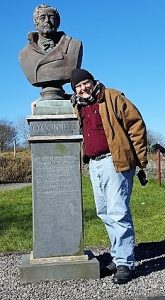
There’s more to the Ring of Kerry than animals, although the animals were very cute.
Our tour guide began talking about a fellow which I understood to be Donald O’Conner who was the father of Ireland. We were going to stop at his birthday place so we could take pictures. Now I thought Donald O’Conner was a great song and dance man. His number in Singin’ in the Rain, Make ‘Em Laugh, was hilarious and when he went through that fake wall, I laughed. But the father of Ireland? Isn’t that taking great entertainment a step too far? It seemed I needed to clean out my ears. The tour guide said Donald O’Connell not O’Conner. O’Connell was born in the seventeenth century and was the first Irishman elected to the British Parliament. That was a big deal since Irishmen couldn’t even vote at the time. So when we stopped I had my son Josh take my photo with Donald’s statue which overlooked the ruins of the house where he was born. He may not have been able to make people laugh but he was able to begin the legal battle for his countrymen’s political rights.

I want to talk about the little town of Sneem again. You know, the one with the mountain goat and the statue of the world champion wrestler. It has a waterfall too. The teen-agers from our group were going down these steep steps to cross the jagged rocks to the edge of the falls. They were laughing and having fun. And I thought to myself, “Why can’t I have the same kind of fun as these teen-agers?” Then I remembered, “Oh. Yeah. I’m 70 years old and have a bum knee.” The other side of my brain reminded me that I wasn’t going to be in Sneem, Ireland, again anytime soon so if I wanted to climb over the rocks to the waterfall I better do it now. When my son saw he wasn’t going to be able to talk me out of this foolishness he decided he’d better come with me to pick up the body when I slipped and fell. Once I got down to the rocks I realized there was more than climbing involved in standing at the falls. There was also jumping from rock to rock. In addition, even though it felt rather warm out that day, the water puddled up between the rocks was frozen. My son took my picture, then told me I needed to get back to the bus before I broke my neck.

I did get a few pictures of Josh, one of them at the Ladies’ View. This place got its name because when Queen Victoria and her entourage came on a sightseeing tour of Ireland this long valley of lakes and streams, her ladies in waiting liked this view the best. They had good taste in scenery. The main reason I included this picture was because of my son. Every time I wanted to photograph him I had to tell him to take off his sunglasses, smile and don’t hold his hands either in front of him or behind him. Just let them hang there. He’s a Florida corrections officer and that pose is the one he takes most often at work.
“I don’t want a picture of Officer Cowling. I want a picture of my son.”
Officer Cowling is a very good state employee. He keeps order at the prison. He is trained in self-defense. I have a better bodyguard than many celebrities. I like Officer Cowling. I trust Officer Cowling. But I love my son Josh Cowling and I want pictures of him.

The weather on our trip was more than we could have asked for. I had several layers of clothing on—everything from my longjohns to heavy boots and coat, scarf and woolen cap because the temperatures were going to be between the 30s and 50s. And Ireland in March is rainy, very rainy. I had an umbrella and rain poncho in my backpack just in case. But not a drop of rain. We became totally aware of how lucky with the weather at lunch on the Ring of Kerry. This restaurant sat on a cliff side overlooking a bay dotted with little islands and outcroppings. The bus driver said if we had come a day earlier we would have seen nothing but fog.
Josh and I grabbed a table next to the long window overlooking the view. Most of the students gathered together along the other wall to giggle and chat. But one boy sat at the next table to us against the window and stared out at the view the entire time. It struck me that he got it. He knew what this trip was all about. I have nothing against giggling and chatting. Some of the best times I have had in my life have been giggling and chatting. But we can giggle and chat anywhere. When you’re on the Irish coast on a clear day in March, you look out the window. When you’re in Sneem, you climb on the rocks. When you’re in the valleys of Ireland, you relax and smile. This kind of stuff doesn’t happen often.
David, Wallis and the Mercenary Chapter Twenty-Seven
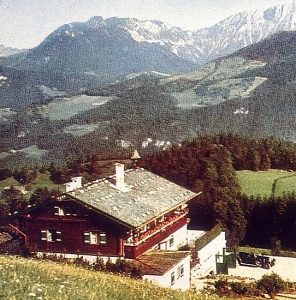
Previously in the novel: Novice mercenary Leon fails in kidnapping the Archbishop of Canterbury because of David, better known as Edward the Prince of Wales. Also in the world of espionage is socialite Wallis Spencer. Wallis, in quick succession, dumps first husband Winfield, kills Uncle Sol, has an affair with German Joachin Von Ribbentrop and marries Ernest.
The November air in Berchtesgaden 1929 was bracing. Joachim Von Ribbentrop stood on the balcony of his hotel taking in the view of the beauty of the Bavarian Mountains covered in snow. Berchtesgaden was on the southern border of Germany and Austria, not far from Munich and the Black Forest. Although the weather and scenery always reinvigorated his spirit, Ribbentrop could not help but think back to his exotic encounter with Wallis Spencer in Paris over a year ago. Wallis expertly removed every layer of clothing from his body but only stripped down to her satin slip. She could do things with her hands and mouth that threw him into a sensual madness.
He read in the newspaper she recently married Ernest Simpson. He hoped she remembered it was his help with finding a lawyer that made her new-found happiness possible. Ribbentrop felt he had to be with her again and give her another white carnation in tribute to their experience.
A knock at the door broke his revelry. A slender young man dressed in a crisp shirt and slacks and a jacket with a swastika on the sleeve, stood attention when Ribbentrop opened the door. He knew he was looking at an emissary from Herr Adolph Hitler, the most powerful politician in Germany.
“Herr Hitler requests your presence at Berghof.”
Ribbentrop smartly clicked his heels, put on his overcoat and followed the young man downstairs to a waiting black limousine. He settled into a comfortable position in the back seat while the brown-shirted boy sat in front with the driver. On the long, winding drive through the mountains, Ribbentrop congratulated himself in his skillful manipulation of his socially influential friends to gain an audience with the man who one day would rule Germany—indeed, all of Europe with an iron hand. His mind, however, could not help but wander back to Wallis. He knew she would be impressed when she learned he was close friends with Adolph Hitler.
When the car made a final turn to reach its mountaintop destination, Ribbentrop was disappointed to see that Berghof was a rather small, unimpressive hunting chalet. He expected Herr Hitler to have more awesome accommodations. The limousine came to a stop in front of the entrance, and a teen-aged girl scurried out, opened his door and curtsied.
“Herr Hitler is waiting for you in parlor,” she said as she escorted him into a plain vestibule, turned right and opened a door to a darkened room.
All the curtains were closed and a movie screen hung on the far wall. Several comfortable chairs were centered in front. A black and white cartoon of a dancing mouse on the deck of a boat played across the screen. A catchy little tune filled the room along with male laughter.
“Herr Von Ribbentrop?” a voice called out.
“Yes, sir?”
“You’re late!”
Ribbentrop thought how he could be late since he could go nowhere until Hitler’s limousine arrived at the hotel.
“Don’t worry. No one can live up to my exacting standards.”
Hitler stood and turned toward Ribbentrop, his face illuminated by the glare of the movie projector, a dancing mouse flitting across his forehead.
“I have heard many good things about you. You are an excellent salesman of a totally useless product—champagne. I admire that. That’s what a good leader is, you know, a salesman.” He patted the armchair next to his. “Come, sit.”
As Ribbentrop sat, Hitler stared at him and raised a knowing eyebrow. “I am sure you are thinking how this man can be the future of Germany and live in such an ordinary house. Well, I am renting it from Herr Wachenfield. I plan to buy it soon and turn it into a show place to rival the grandest castles on the Rhine.” He sat back to continue to watch the cartoon, which played over and over again. “That mouse, he’s very funny. He’s small but he always wins, always. That’s like Germany, you know. It’s small, but it can win, always win, when it has the right man at the helm of the steamboat.” He glanced at his visitor. “Do you think I’m a good steamboat captain?”
“Yes, Herr Hitler.”
“Good. You have skills beneficial to my cause. You are a celebrity among the London social crowd, are you not? You can do much to win them over. They are particularly vulnerable since they already open to the idea of following a supreme leader like a king.” He spat in derision. “That stupid man. I tried to interest the Prince of Wales in our Princess Stephanie. She’s a Jew, but nevertheless beautiful and completely loyal to me.”
“I know Stephanie very well,” Ribbentrop interjected. “She asked to introduce her to the prince.”
“Yes, I know,” Hitler replied with a sly smile. “I know everything.”
“What can I do for you, mein fuhrer?” He swallowed hard.
“Since Stephanie was unable to seduce the prince into being our surrogate,” Hitler explained, “we have to find a way to demoralize the English people to the point of discarding their own government and welcome me as their ruler.”
“How can I do that?”
Hitler leaned in, but first peeked at the screen and smiled at the mouse’s antics. “I love how that little mouse dances. Walt Disney is the only American I have any respect for.” After a pause, he continued, “Help me to steal the crown jewels of England.”
“What?” Ribbentrop blinked.
“This is not a new idea. It was in an English novel. Arthur Conan Doyle. One of those Sherlock Holmes mysterious.” He raised an eyebrow. “You must read British literature, don’t you?”
Ribbentrop blinked again. “I prefer the German classics.”
“Well, of course. But you must open your mind to new ideas, even if they come from the English.”
“Of course, mein fuhrer.”
“Once the English people realize I was able to steal the jewels from the Tower of London, they will see their government is completely impotent, incompetent. Demoralized, they will turn to me to lead them.”
“How can we steal the jewels.” Ribbentrop felt himself getting drawn into Hitler’s vision.
“Out of your many acquaintances in London, surely someone has a connection with a person who works at the Tower of London. Use your influence to have them steal the diamonds.”
Ribbentrop smiled. “I think I know such a woman. A Mrs. Barnes. Her husband is the ambassador to Tanganyika. They are currently in London but will return to Africa within the month. I have had desperate telephone calls from her begging for a rendezvous before she leaves.”
“Does she love you?” Hitler looked up to the projectionist. “That’s enough for today. Come back tomorrow.”
“She loves sex.”
“Are you sure she’s British?”
“Yes. I’ve found it is mostly the men who are the cold fish, especially the rich ones.”
“Continue.” Hitler showed no emotion.
“She talks all the time about her brother-in-law who is the assistant administrator at the Tower of London. She’s having sex with him too and is afraid her husband will find out. Her lover has direct access to the crown jewels. The little idiot doesn’t even understand the importance of what she said.”
“Can you trust her?”
“Of course not. She doesn’t have the sense to be trusted. That’s why I would not tell her who will get the jewels eventually.” Ribbentrop pulled out a cigarette and lit it. He began to relax with the fuhrer “I have an idea. I’ll tell her I have connections to a secret world-wide crime organization which will pay handsomely for the diamonds. They will be able to re-cut them and sell them on the open market. She will receive a handsome payment.”
Hitler’s face clouded in suspicion. “Is there such an organization?”
“Oh.” His eyes widened in surprise. “No. Of course not. I just thought of it. You inspired my imagination.”
“Of course I did.” Hitler leaned back with a smug smile.
“Then I’ll instruct her to take the jewels with her back to Africa for transfer to the, um, organization.” He waved his cigarette about nervously. “Ambassadors’ luggage is rarely inspected by customs agents. Then one of your men can secure the diamonds from her on the train in Tanganyika.”
Hitler grimaced in deep thought then stood. “Good. Do it. You may leave now.”
Ribbentrop stood, clicked his heels and bowed. He found it hard to smile because Hitler stepped closer to examine his face. Perhaps the fuhrer sensed he was lying about the organization.
“I momentarily considered sticking my tongue into the dimple on your chin.” Hitler extended a finger and touched Ribbentrop’s cleft. “But I changed my mind.”
Ireland and England with Jerry and Josh–Land of Animals Part Two
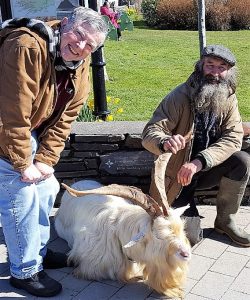
Our next stop on the Ring of Kerry was Sneem, an Irish village whose only claim to fame was that the world wrestling champion from 1942 to 1947 was a local boy, so they put a statue of him up on the town square. To put this in perspective, I was born in 1947 so the town of Sneem has been in a dry spell for a long time. The most interesting thing on the town square was on the other side where this man with a long gray beard had his pet mountain goat lounging around, and, of course, his cap was on the ground available to receive tips. He told me he had found his buddy abandoned in the mountains a few years ago, and had trained him to let anybody pet him. I thought this was wonderful. I hadn’t got close enough to pet the baby lambs by the statue of Mary but I got to pet the goat that was kinda close to the statue of the wrestler. I told my son Josh to pull out his camera.
“Yeah,” the Irish gentleman piped up, “get a picture of three old goats.”
I was still laughing as the picture was taken. Also, I decided this was a good way to supplement your retirement fund. Find some adorable animal, set up where a lot of tourists pass by and put your hat on the group for tips. The trick in this is that once you break a five-euro note, you get your change in one-euro coins and the smaller stuff. Most Americans think that all coins represent less than a euro, so when you are tossing what you think is the equivalent of 25 or 50 cents you’re actually tossing away two or three dollars. As a storyteller who puts his hat on the ground, I can tell you that makes a big difference.

Further down the road we pulled into a sheep dog training farm. As soon as we climbed out of the tour bus, a border collie came around the corner of the front gate, looked at us and went back inside to get reinforcements. Before we knew it a team of border collies were racing out to make sure we knew where we were going. First they herded us into a barn where the students, once again, got to hold baby lambs. Of course, I didn’t. But at least I got my goat. Next, the dogs herded us out to a reviewing standing over a craggy valley. Once they were sure we were all in place, the border collies retreated and let the humans—who thought they were in charge of the place—take over. The humans opened a gate and a flock of sheep went willy nilly down the hillside and around a gathering of rocks. Next they released a three-year-old border collie for his daily training of finding the sheep, herding them back up the hill and into a stockade. Actually, it didn’t quite go that way. Another collie, named Lucy and about thirteen years old, came out to watch the youngin’ do his job from the top of the hill. By the time he finally got them close to the stockade, Lucy took over and got them through the gate. I don’t think she had the energy to go all the way out to round them up. In the picture Lucy had already taken over. I really liked Lucy. She wasn’t going to be retired that easily. In fact, I think I loved Lucy.
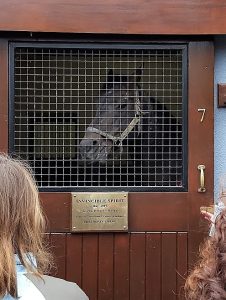
As I had previously said, the Ring of Kerry was the land of animals, even the really expensive kind. On our last encounter with animals on the ring, we stopped at the National Stud Farm, where the best horses in the world meet for romance (well, maybe not romance but I’m trying to be nice here). More thoroughbreds are mated—or as the professionals say, covered—here than anywhere else except maybe Kentucky. The stables for the studs look like a four-star hotel. We peered at one in particular who was considered a star. It seems he didn’t win very many races in his prime but he has sired many horses who have won big time. As the farm guide explained all this to us, I happened to notice a very well dressed couple being given a private tour. I think they were being courted to bring their filly there for a nice honeymoon. A few moments later a handsome stud was led from his stall and around the corner for an encounter. Frankly I felt like a reporter for the National Enquirer for watching this event. Have we no shame? Can’t guy and gal horses get together without everyone watching? We walked over to a quadrangle of stalls where expectant mares were kept comfortable until their time to foal. As we went by we saw one filly, who looked like she was about to pop, being led onto a trailer to take her to the delivery barn. I didn’t think she appreciated having an audience either.

An odd feature to the farm was an extensive Japanese garden. The original owner of the farm—who believed in checking the astrological charts of the horses before breeding began—brought a professional garden designer from Japan in about 1920. When asked why, the man said, “Why not? I’m rich. I can afford it. I like Japanese gardens.” (Actually, those aren’t his exact words, but you get the idea.) With all due respect, I think his garden was more than something pretty to look at the end of the day. I think he was trying to impress the rich people so that they would pay the “cover charges”—so to speak. I think he was telling them that everything on his stud farm was first class and expensive, and that included the gardens.